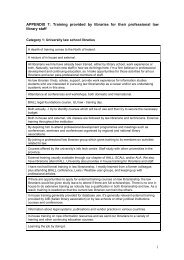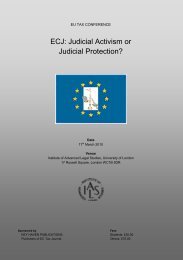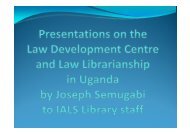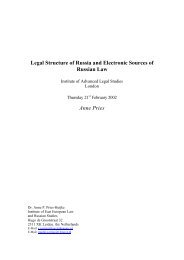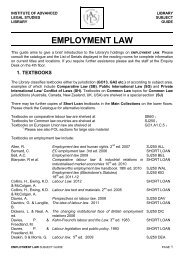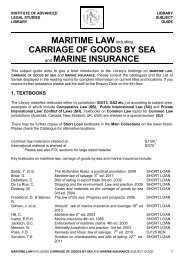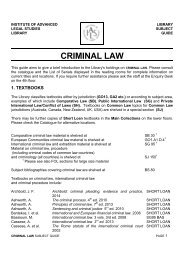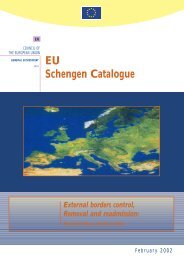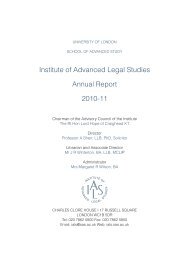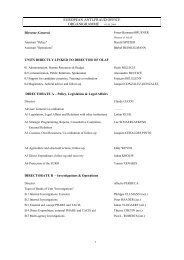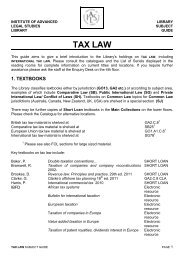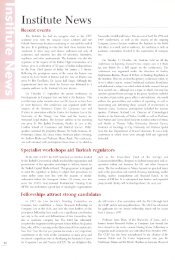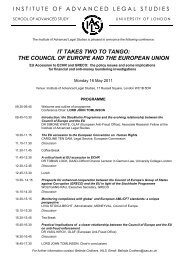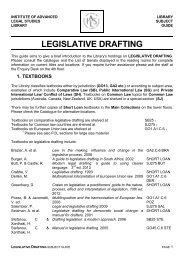a thesis - Institute of Advanced Legal Studies
a thesis - Institute of Advanced Legal Studies
a thesis - Institute of Advanced Legal Studies
Create successful ePaper yourself
Turn your PDF publications into a flip-book with our unique Google optimized e-Paper software.
20 TRUSTS IN GENERAL.<br />
tions Act, 1882, s. 108, however, the council <strong>of</strong> a municipal corporation<br />
may not, unless authorized by act <strong>of</strong> parliament, sell, mortgage,<br />
or alienate any corporate land without the approval <strong>of</strong> the<br />
Local Government Board (51 & 52 Yict. c. 41, s. 72), or in the<br />
case <strong>of</strong> a site for a place <strong>of</strong> worship, under the Places <strong>of</strong> Worship<br />
Sites Acts, 1873 and 1882, <strong>of</strong> the Treasury. Eestrictions have also<br />
been imposed on ecclesiastical corporations by a great number <strong>of</strong><br />
statutes; and also on the principal universities, and some colleges<br />
and other institutions, and on the alienation <strong>of</strong> crown land. (See<br />
Dart, Yendors and Purchasers, vol. i. 6th ed. 20.)<br />
A statutory corporation is restricted as regards the alienation <strong>of</strong><br />
its property by the purposes <strong>of</strong> its incorporation as denned by its<br />
memorandum <strong>of</strong> association or special act. (See Williams,<br />
Vendor and Purchaser, vol. ii. 856.)<br />
II.—CAPACITY TO BE A TRUSTEE.<br />
Infants.—An infant is not incapable <strong>of</strong> being a trustee, but<br />
since he cannot make a binding disposition <strong>of</strong> property (exceptions<br />
excepted), he cannot effectively act as such. In King v. Bellord<br />
(1863, 1 H. & M. 343), for example, a testator devised land to A.,<br />
B., and C., in trust, at their discretion to sell it. C. was an infant,<br />
and it was held that, as a consequence, the trustees could not sell.<br />
Moreover, apparently, he cannot be made liable for a breach <strong>of</strong><br />
trust (Whitmorev. Weld (1685), 1 Yern. 326; Hindmarsh\. Southgate<br />
(1827), 3 Russ. 324) ; though Lord Justice Fry said, in the<br />
case <strong>of</strong> In re Games (1885, 31 Ch. D. at p. 151), that he could<br />
conceive circumstances under which an infant trustee might be<br />
made liable for moneys received by him. When this was said, the<br />
trustee before the court had attained full age. When an infant is<br />
appointed a trustee, the court will appoint a new trustee in his<br />
place. (In re Shelmerdine (1861), 33 L. J. Ch. 474.)<br />
Lunatics.—Lunacy does not prevent a person from acquiring<br />
or holding property, but since it renders him incapable <strong>of</strong><br />
disposing <strong>of</strong> it to some extent, it renders him incapable <strong>of</strong><br />
administering it. By the Lunacy Act, 1890, therefore (s. 116),<br />
powers <strong>of</strong> management and administration are conferred on the<br />
judge in lunacy; and by s. 128 it is provided that in the case <strong>of</strong> a<br />
trustee becoming lunatic his powers as trustee may be exercised<br />
by his committee, and by s. 129 the latter may appoint new<br />
trustees under a power vested in the lunatic.



